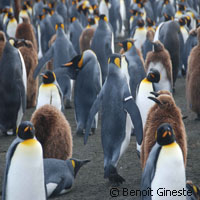Penguin study shows flipper band lowers survival and reproduction rates
Scientists may be harming penguins unintentionally with the metal bands they place on their flippers to monitor breeding and foraging and how they deal with climate change, new research suggests. Writing in the journal Nature, the scientists from France and Norway say the bands prevent the seabirds from swimming effectively, impacting both their survival and reproduction rates. The study was funded in part by a Marie Curie grant under the EU's Seventh Framework Programme (FP7). The team used a 10-year-long data set to evaluate the differences in reproduction and survival rates between two groups of electronically monitored king penguins (Aptenodytes patagonicus, 50 banded and 50 non-banded) on Possession Island in the Crozet archipelago between Africa and Antarctica. The differences were tied to the penguins' time of arrival for breeding and the length of their foraging trips. Their findings show that the average annual survival rate was 5% lower in banded penguins, resulting in a 16% lower survival rate in the period 1998-2008. The number of chicks produced during this period totalled 47, representing a drop of around 40%. The no-band penguins assessed in the study produced 80 chicks in the same period. Despite wearing the bands for so long, the banded penguins were unable to adapt to the extra weight. They failed to arrive at their breeding site on Possession Island on time and expended more time looking for food. The scientists say penguin chicks bred late in the season are at a higher risk of not surviving because the adults have a much harder time securing food as the supply shrinks. Ecologists use metal bands because they can identify and monitor the penguins from a distance, with just the use of binoculars. The problem, however, is that the seabirds spend around 24% more energy swimming. The metal flipper bands cause drag and physical damage. The seabirds look haggard and much older. The scientists advise that metal band use should be phased out, and other non-harmful tagging methods used, such as subdermal tags. 'These birds have been marked for life,' explains Professor Yvon Le Maho from the University of Strasbourg and the National Centre for Scientific Research (CNRS) in France, a senior author of the study. The scientists say it is unethical of researchers and conservationists to continue the use of metal tags. And they add that the predictive value of data generated by the use of banded birds can be called into question. 'One of our major findings is that responses of flipper banded penguins to climate variability (that is, changes in sea surface temperature and in the Southern Oscillation index) differ from those of non-banded birds,' the authors write. 'Only long-term investigations may allow an evaluation of the impact of flipper bands and every major life-history trait can be affected, calling into question the banding schemes still going on.' In 2007, the IPCC underlined the need to evaluate the responses of marine ecosystems to climate change. Experts predict global warming will have a huge impact on the Southern Ocean ecosystems, home to penguins which generally have a 20-year lifespan. The king penguin lives even longer.For more information, please visit:National Centre for Scientific Research (CNRS):http://www.cnrs.fr/index.phpNature:http://www.nature.com/nature/index.html
Countries
France, Norway



